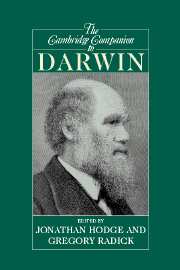Book contents
- Frontmatter
- Introduction
- PART I DARWIN’S THEORISING
- PART II HISTORICAL CONTEXTS
- 6 Is the theory of natural selection independent of its history?
- 7 Darwin’s science and Victorian philosophy of science
- 8 Darwin and Victorian Christianity
- 9 Darwin, social Darwinism and eugenics
- 10 From Darwin to today in evolutionary biology
- PART III PHILOSOPHICAL THEMES
- PART IV WAYS FORWARD
- Guide to further reading
- List of references
- Index
9 - Darwin, social Darwinism and eugenics
from PART II - HISTORICAL CONTEXTS
Published online by Cambridge University Press: 28 May 2006
- Frontmatter
- Introduction
- PART I DARWIN’S THEORISING
- PART II HISTORICAL CONTEXTS
- 6 Is the theory of natural selection independent of its history?
- 7 Darwin’s science and Victorian philosophy of science
- 8 Darwin and Victorian Christianity
- 9 Darwin, social Darwinism and eugenics
- 10 From Darwin to today in evolutionary biology
- PART III PHILOSOPHICAL THEMES
- PART IV WAYS FORWARD
- Guide to further reading
- List of references
- Index
Summary
AMBIVALENCES AND INFLUENCES
How does Darwin's Darwinism relate to social Darwinism and eugenics? Like many foes of Darwinism, past and present, the American populist and creationist William Jennings Bryan thought a straight line ran from Darwin's theory ('a dogma of darkness and death') to beliefs that it is right for the strong to crowd out the weak, and that the only hope for human improvement lay in selective breeding. Darwin's defenders, on the other hand, have typically viewed social Darwinism and eugenics as perversions of his theory. Daniel Dennett speaks for many biologists and philosophers of science when he characterises social Darwinism as 'an odious misapplication of Darwinian thinking'. Few professional historians believe either that Darwin's theory leads directly to these doctrines or that they are entirely unrelated. But both the nature and significance of the link are disputed.
This chapter examines the views held by Darwin himself and by later Darwinians on the implications of his theory for social life, and it assesses the social impact made by these views. More specifically: section II discusses the debates about human evolution in the wake of Darwin’s Origin of Species (1859).3 Sections III and IV analyse Darwin’s ambiguous contribution to these debates. Sometimes celebrating competitive struggle, he also wished to moderate its effects, but thought restrictions on breeding impractical and immoral. Sections V and VI see how others interpreted both the science and social meaning of Darwinism. Darwin’s followers found in his ambiguities legitimation for whatever they favoured: laissez-faire capitalism, certainly, but also liberal reform, anarchism and socialism; colonial conquest, war and patriarchy, but also anti-imperialism, peace and feminism.
- Type
- Chapter
- Information
- The Cambridge Companion to Darwin , pp. 214 - 239Publisher: Cambridge University PressPrint publication year: 2003
- 33
- Cited by



